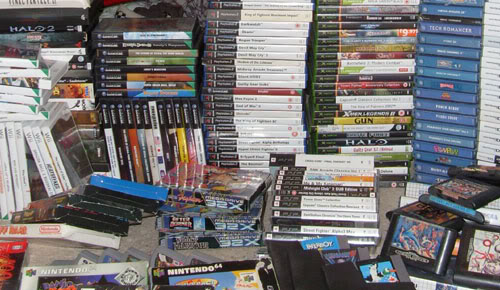This post has not been edited by the GamesBeat staff. Opinions by GamesBeat community writers do not necessarily reflect those of the staff.

If you love video games like I do, then you probably have a backlog of titles. For whatever reason, you've accumulated what appears to be an insurmountable stockpile of games. Sometimes it feels like the stack is getting bigger, probably because it is. Perhaps you took advantage of that sale at the store last week or you found a Nintendo Entertainment System bundle with 197 cartridges for the price of a Wii at the local flea market. With so much to play, you might even feel like your backlog is trying to eat you in your sleep.
So let's take a look at why this phenomenon happens and discuss some techniques that can help us conquer our backlogs. After all, knowing is half the battle.
Too many good games come out
Don't you just love looking forward to an awesome new release? How about looking forward to 10 new releases in the same month? Yeah, I thought so. You're have little time, but the interactive-entertainment industry doesn't care. It'll continue to spit out more and more content. Once the desire kicks in, you're going into a shop to buy something. You might even walk out with at least three more discs you couldn't pass up.
Playing the sequel of that sequel to buy that other sequel
Just when you've finished awesome experiences like Mass Effect and Uncharted: Drake's Fortune, their developers announce upcoming sequels at the next major industry conference. Just when you thought this couldn't get any worse, you find out that "superbly engineered classic" is also receiving another continuation. And so it begins.
It's easy to fall behind the sequel train. The amount of depth in today's games is far more advanced than what we saw in most retro gems. Depending on the experience, completing an entire chain of newer hits could take dozens, if not hundreds, of dedicated hours. Meanwhile, our collections keep growing as a result.
An abundance of excellent prices and sales
Tomba! for $1.50 at a thrift store? Sold. PSP games on clearance? Sign me up! It's always great when opportunity comes knocking on your door, but when should you stop answering? Before you know it, "opportunity" is eating all of your food and wasting your electricity.
Most of us have wandered into stores without looking for anything specific and ended up buying something. This usually happens at used game stores, thrift shops, and flea markets. Depending on the situation, these retailers are typically willing to sell for less. Sometimes conventional retail shops will have deals, but you'll mostly run into weird products.

So what can we do in order to vanquish the dreaded backlog? We fight back. Our first handy weapon in this war is the Internet itself and game logging websites like Raptr and Backloggery. Many other gaming sites also contain lists or "currently playing" columns that can be helpful. You can also use the following conventional methods to aid you in your quest.
Create a backlog pile or shelf
Most gamers already do this, and it's a great way to get the ball rolling. For example, I have a smaller shelf on my wall that's usually empty. Since it's closer to my consoles, I've decided to use the first seven sections as a "currently playing" rack which is perfect for just grabbing a game and jumping right in. Even if you only have one shelf, you could devote a section to your gaming queue.
Doing this might not seem too effective at first — since you're not magically creating more time — but it's still a great way to organize. Besides, you never know where that pile could randomly wind up. Seriously, what if your dog eats it?
Make a list
This is similar to the shelf technique, though it might be more helpful in the long run. Take a look at your shelf or pile, and make a list of which titles appeal to you the most. You could even grade these releases on a numerical scale, with one being the least interesting and 10 being a must-play.
Create a schedule
Yeah, I know. Why would you want to turn gaming into a chronologically regulated chore? Of all the methods I've listed, this one excites me the least, but it's probably the most useful. It's amazing how many spare moments we have in our life, especially when we start keeping track of our time. If you have a television show you're into and see a rerun, then play an hour of Mass Effect instead. If you know you're going to be stuck in a waiting room at the doctor's office, bring your PSP or DS along.
Like everything involved with schedule building, writing things down on paper really helps. You could even invest in a schedule book. This would also allow you to track your progress while giving you an opportunity to plan ahead.
